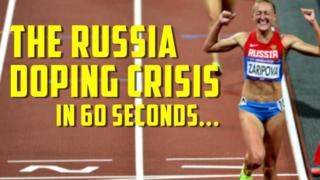
UK Athletics has suggested world records should be reset to help achieve a “new era” of clean competition.
The sport’s governing body has made several proposals, including a public anti-doping register of tested athletes and longer bans for drug cheats.
UKA chairman Ed Warner said it was time for “radical reform”, adding: “The integrity of athletics was challenged as never before in 2015.”
World athletics has been hit by several doping and cover-up allegations.
Russia has been barred from international competition for alleged “state-sponsored doping”.
Lamine Diack, the former boss of world governing body the IAAF, is under criminal investigation over allegations he took payments for deferring sanctions against Russian drugs cheats. He denies wrongdoing.
And three IAAF figures – including Diack’s son, Papa Massata Diack – have been given lifetime bans after a report claimed they “conspired” to blackmail a Russian athlete in order to cover up her doping violations.
New IAAF president Lord Coe has also pledged to double the anti-doping budget, establish a separate integrity unit for athletics before Rio 2016, and double the international testing pool of athletes to 1,000.
What else does UKA suggest?
Warner says trust in the sport is at its “lowest point for decades”, adding clean athletes and fans “have been let down”.
“Greater transparency, tougher sanctions, longer bans – and even resetting the clock on world records for a new era – we should be open to do whatever it takes to restore credibility in the sport,” he said.
Some of the key recommendations:
- World Anti Doping Agency (Wada) should maintain a public global register of all drugs tests including times and places of tests
- If not, UK Anti-Doping (Ukad) and UK sport should take the lead on a British register and the idea of a register of missed tests should be investigated
- Change the three strikes system so that missing three tests over a longer period of time (currently 18 months) can lead to a ban
- Clean athletes to be compensated for loss of prize money by member federations when drug cheats are banned and results annulled
- The IAAF should look into drawing a line under all pre-existing world records and starting again
- Minimum of eight-year bans for drug cheats so they miss two Olympic or Paralympic cycles, plus life-time bans where appropriate
- Criminalise the supply or procurement of performance enhancing drugs
- Re-name all anti-doping agencies under one umbrella – for example Ukad would become Clean Sport UK
A big week for athletics
On Monday, UKA will publish its Oregon Project review recommendations.
It has already found that there is “no reason to be concerned” by Mo Farah’s US-based training regime or his coach Alberto Salazar, a British Athletics consultant.
A full review ruled there was “no evidence of any impropriety” from Britain’s multiple Olympic gold medallist and no reason to “lack confidence” in his elite training programme.
The review was prompted by a BBC Panorama programme which accused Salazar of practising doping techniques with other athletes, which he denies.
There is no suggestion Farah, 32, has been involved in doping.
UKA did not plan to release any further information until formal investigations by Ukad and the US Anti-Doping Agency were complete.
But Warner said “the need for transparency overrides our previous position”.
On Thursday, part two of a damning World Anti-Doping Agency independent panel report into doping in athletics will be published.
It was delayed to allow criminal investigations to progress.
International police body Interpol confirmed it was co-ordinating a global investigation into suspected corruption and doping.
It is expected to focus on claims made in a German TV documentary that the IAAF was complicit in covering up systematic doping and extortion in Russian athletics.
Analysis – Sports editor Dan Roan
“This is a radical set of proposals by UKA, which is desperate to see progress on anti-doping amid the worst crisis the sport has known.
“It believes the IAAF, run by Lord Coe, is too preoccupied with salvaging its own credibility after recent corruption allegations.
“With time running out to restore public trust before the 2017 World Championships in London, it has taken it upon itself to lead a debate.
“Greater investment, tougher sanctions and more transparency will be welcomed by many in the sport.
“However, Ukad was surprised that it was not consulted on the manifesto and only found out about it on Saturday.
“It may decide to raise concerns over the idea of greater publication of testing and the lengthening of bans given it feels the current four-year sanction is proportionate.
“The idea of starting a new ‘clean era’ when it comes to world records will also be controversial.
“UKA is also publishing recommendations from its review into Farah’s training programme with Salazar at Nike’s Oregon Project.
“I understand these will focus on improvements to procedure, book-keeping and administration.”



